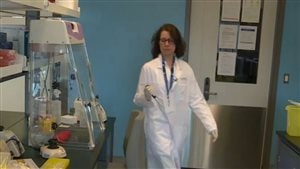Your hosts today, Marc and Wojtek.

The ruling federal Conservative Party tabled its budget this week and all analysts consider it to a preparation for a federal election in October.
This budget has a slight surplus with proposals for various tax breaks, new programmes, and a proposal that would make it obligatory for all future governments to maintain balanced budgets.
One aspect that angered the opposition New Democratic Party was a proposal for tax breaks for small businesses.
What angered them was that they had proposed it in February and the Conservative Party had voted against it.
Wojtek prepared a report.
A new study out of Montreal has found that about 20 percent of women with ovarian cancer carry mutated genes, BRAC-1 or BRAC-2.

These may be passed on to descendants and so the researchers say every woman who has had ovarian cancer should be tested for the gene, and if so, their children should also be tested.
This is to determine whether the descendants have an increased risk, and if they test positive for mutations in these genes, to get advice on reducing risk. However, males can also be passed the gene with little effect but in turn can pass it to female descendants.
Lynn spoke with Patricia Tonin, McGill University researcher and professor.

The technology to modify the human genome and embryos, and the genetic material in sperm and eggs, has been evolving at a rapid pace but that same ability has caused concern among many scientists worldwide.
The original goal of such research was the ability to removed mutated and disease causing genes, and splice in non-mutated genes. This so-called gene therapy would then eliminate the genetic disease.
But scientists are concerned that while this may help individuals, modifying the actual human “germ line” in sperm, eggs, or embryos, would result in changed humand genome being passed to future generations.
There have been at least three separate calls by researchers for a moratorium in order for society to discuss the implications of such research before it continues, and if it should continue.
Marc spoke to Tim Caulfield, a legal expert in the field of medical research.







For reasons beyond our control, and for an undetermined period of time, our comment section is now closed. However, our social networks remain open to your contributions.